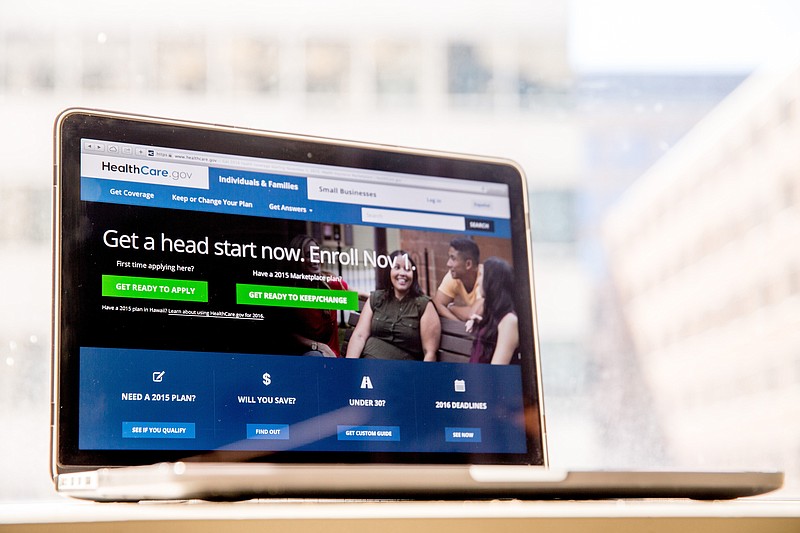Read more
Price of health exchange plans poised to rise dramatically in TennesseeTennessee approves costly health exchange price hikes for state's biggest insurersAs rates soar, Tennessee insurers and regulators say Obamacare proving too risky, costlyNew study finds most Tennesseans will still be able to get individual health coverage for under $75 a month
Despite record increases in individual health insurance rates planned for 2017, most Tennesseans should still be able to buy health care coverage for under $75 a month next year by shopping around for the cheapest plan and taking advantage of federal tax subsidies, according to a new government study released today.
A new analysis conducted by the Department of Health and Human Services estimates that 81 percent of consumers in Tennessee will pay under $75 a month - and 83 percent will pay $100 or less monthly - to buy individual health insurance through the ObamaCare marketplace. Federal subsidies will go up along with higher insurance premiums next year, which state regulators approved this week for major insurers varying from 44 percent to 62 percent in Tennessee.
"Headline rate increases do not reflect what consumers actually pay," Kathryn Martin, acting assistant secretary for planning and evaluation with Health and Human Services said today. "Our study shows that, even in a scenario where all plans saw double digit rate increases, the vast majority of consumers would continue to have affordable options."
That's because the Affordable Care Act signed into law by President Obama in 2010 provides subsidies to help most low- and moderate-income individuals pay for their insurance as a share of their income. Although the government will have to shoulder a bigger share of the costs of the marketplace plans to pay for a higher level of subsidies, most individuals won't have to absorb all of the increases.
On Tuesday, the Tennessee Department of Commerce and Insurance approved average rate increases for individual health insurance plans of 62 percent from BlueCross BlueShield of Tennessee, 46.3 percent for Cigna and 44.3 percent for Humana policies.
The increases for 2017 follow raises between 5 and 37 percent on such plans in 2016. Such increases are making health care unaffordable for many, according to U.S. Sen. Lamar Alexander, R-Tenn., who said Tuesday that Obamacare "cannot be allowed to continue."
But in a news briefing today with reporters, HHS officials pushed back against such criticism. The rate increases approved for this year, for instance, didn't force most consumers in Tennessee to pay a lot more for coverage.
"Last year, despite headlines projecting double-digit rate increases, the average premium increased just $4 per month for HealthCare.gov consumers with tax credits, and seven out of 10 Marketplace consumers could purchase 2016 coverage for less than $75 per month," HHS said in its study.
Consumers also can shop around among competing plans under Obamacare.
"We have a vibrant marketplace where people can come and shop online and look for what best fits their needs," Martin said.
Last year, more than 43 percent, or 60,325 returning Tennessee HealthCare.gov consumers switched plans. They saved an average of $52 per month, Martin said.
However, next year in Tennessee, 57 counties will have only one health insurer and only 38 of the state's 95 counties will have more than two providers. The state's cooperative plan, Community Health Alliance, shut down last year and the nation's biggest health insurer, United Healthcare, exited the Tennessee marketplace after only a year.
Even with an average 62 percent rate increase approved for its 2017 plans, BlueCross also says it is still studying whether the risks are too great to continue with its individual coverage plans in 2017 under the marketplace. BlueCross will announce next month whether it will continue to participate in the marketplace exchange in 2017.
Although marketplace rates will have doubled by next year from their original levels in 2014 by BlueCross in Tennessee, HHS said rates so far under the ObamaCare plans nationwide have been 12 to 20 percent below initial projections through 2016.
Ben Wakana, deputy assistant secretary for public affairs for HHS said the overall cost of the Affordable Care Act is still below what the Congressional Budget Office projected when the law was drafted, although next year's jump in rates could push rates in Tennessee above those levels.
Last year, 231,400 Tennesseans signed up for marketplace plans under ObamaCare among more than 13 million persons who enrolled in marketplace plans across the country. That represents only about 4 percent of all Tennesseans.
Most persons in Tennessee and the vast majority of those with plans from BlueCross and Cigna are covered by employer-sponsored plans while many others are enrolled in Medicare and Medicaid plans not directly affected by the dramatic rate increases approved for individual plans for 2017.
Martin said since the Affordable Care Act became law, health care prices overall have risen at the lowest rate in 50 years even with the dramatic increases planned by the health insurers for the marketplace plans.
"Premiums for the 150 million Americans with employer-sponsored insurance have grown at some of the slowest rates on record," she said.
